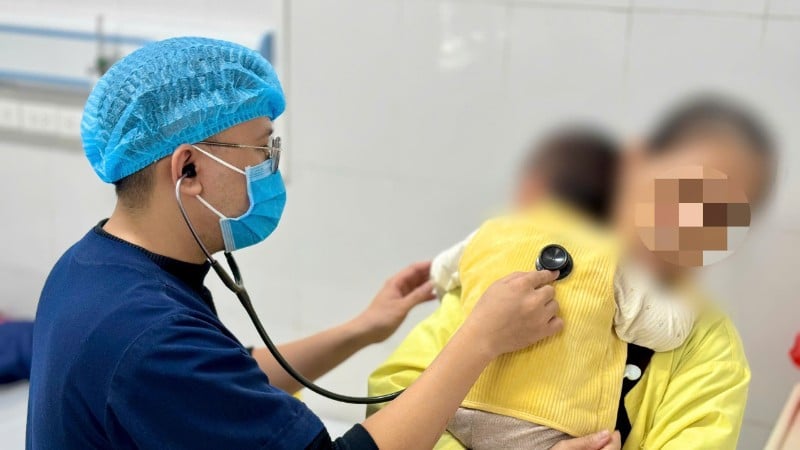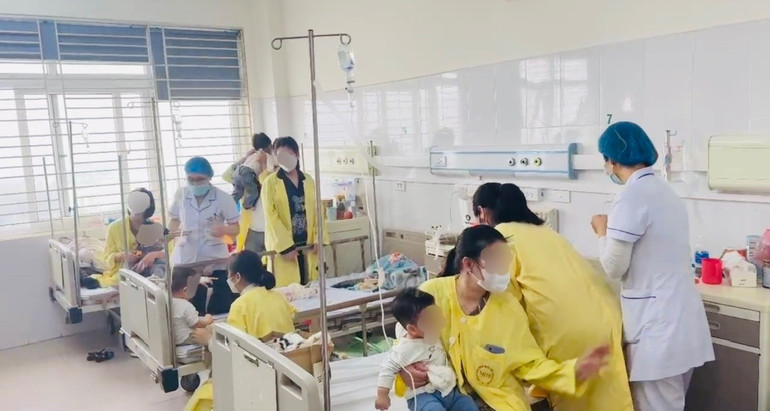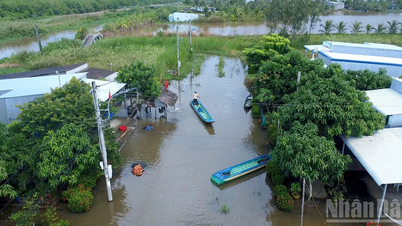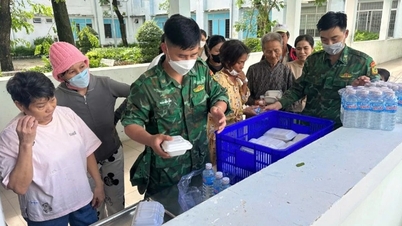
The Central Hospital for Tropical Diseases is currently treating nearly 50 patients with influenza A.
A 16-month-old patient, TT H ( Hanoi ), was diagnosed with influenza A, with bronchitis and pneumonia, and was fortunately discovered and treated promptly. The child was healthy and lived with a family whose older sister had the flu. Three days before being admitted to the hospital, the child had a high fever, runny nose, and a dry cough, followed by wheezing and coughing up thick phlegm. The child was exhausted, had poor cough, and had a lot of phlegm.
The child came to the Central Hospital for Tropical Diseases for examination and the test result for influenza A was positive. Clinical examination showed signs of secondary infection in the lungs, with many moist lung patches and rales on both sides. Chest X-ray image at admission showed bilateral bronchopulmonary lesions and obvious bacterial superinfection.
Blood tests showed a severe infection: White blood cells increased by 13.8g/l, CRP 51mg/l - more than 10 times higher than normal. If not detected and treated early, the disease can progress rapidly to acute respiratory failure or sepsis.
After 2 days of inpatient treatment, the child responded well, fever reduced, breathing improved, and breastfeeding resumed, but still needed close monitoring.
Another case is a female patient HL (10 years old), hospitalized with a high fever of 39.5 degrees Celsius, severe cough, vomiting more than 10 times/day, sometimes vomiting blood, feeling exhausted, unable to eat or drink.

In addition, the child showed signs of pain in the bones and joints throughout the body, body aches, and severe headaches - typical symptoms of influenza A infection. The examination results determined that the child had influenza A but had no complications. The child was hospitalized for treatment according to the correct regimen, and was also supported with pain relief, anti-vomiting, electrolyte replacement, and close monitoring.
Master, resident physician Nguyen Dinh Dung said that influenza A is an acute infectious disease transmitted through the respiratory tract, which can occur at any age, but young children, the elderly or people with underlying diseases are at higher risk because their immune systems are weak and susceptible to serious complications.
"Notably, the early stages of influenza A are often similar to other respiratory viruses, but the disease can progress very quickly, causing serious complications such as pneumonia, respiratory failure or sepsis if not detected and treated promptly," said Dr. Dung.
According to Dr. Dung, most children with influenza A have a high fever, runny nose, and increasing cough, accompanied by fatigue and crying. Older children and adults often have more obvious symptoms of body aches and pains in bones and joints. In addition, children may have convulsions due to high fever, vomiting, and diarrhea.
If the disease progresses, the child may become lethargic, less responsive, refuse to breastfeed, breathe rapidly or have chest retraction - all of which are warning signs of complications.
Therefore, parents need to closely monitor their children's health. When children show signs of illness or fever, they should be taken to the nearest medical facility for examination, early diagnosis and proper treatment.
"Do not use medicine at home without permission, especially antibiotics. Taking your child to the doctor promptly will help with proper treatment and limit serious complications," Dr. Dung advised.

With the increase in influenza A cases during the changing seasons, disease prevention, especially by getting a flu vaccine, is extremely important to protect the health of the whole family.
Specialist II Doctor Nguyen Nguyen Huyen, Director of the Center for Disease Prevention, emphasized that currently, the changing weather and erratic temperature changes are favorable conditions for the influenza A virus to spread strongly in the community. Annual flu vaccination is a simple but extremely effective measure to help protect health, reduce the risk of disease and avoid dangerous complications, especially in young children, the elderly, pregnant women and people with underlying diseases.
People should proactively vaccinate themselves and their children against the flu, especially during times of increasing epidemics. In addition, it is necessary to maintain personal hygiene, wash hands regularly, wear masks when going to crowded places and isolate sick people to limit the spread in families and schools.
Source: https://nhandan.vn/gia-tang-tre-mac-cum-a-nhap-vien-post921587.html




![[Photo] Cutting hills to make way for people to travel on route 14E that suffered landslides](https://vphoto.vietnam.vn/thumb/1200x675/vietnam/resource/IMAGE/2025/11/08/1762599969318_ndo_br_thiet-ke-chua-co-ten-2025-11-08t154639923-png.webp)


















![[Video] University of Foreign Languages - Vietnam National University, Hanoi received the First Class Labor Medal](https://vphoto.vietnam.vn/thumb/402x226/vietnam/resource/IMAGE/2025/11/08/1762614378165_gen-h-z7203450341291-b1f427bb0cccc706a5bcc4b985f90a70-7234-jpg.webp)










![[Video] Hue Monuments reopen to welcome visitors](https://vphoto.vietnam.vn/thumb/402x226/vietnam/resource/IMAGE/2025/11/05/1762301089171_dung01-05-43-09still013-jpg.webp)



































































Comment (0)